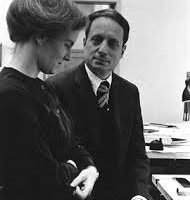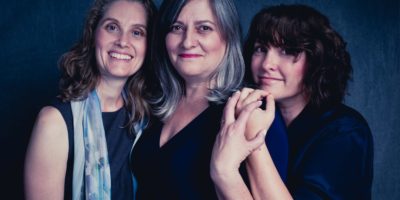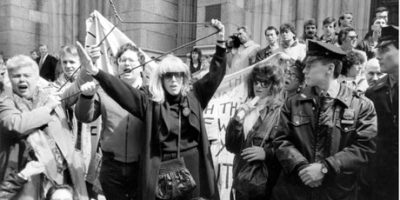Women Moving in from the Comic Sidelines
“What does it mean to be a feminist today?” asks Shannon O’Leary in her introduction to The Big Feminist But: Comics about Women, Men and the IFs, ANDs & BUTs of Feminism. Edited by O’Leary and Joan Reilly, the book consists of almost three dozen black-and-white contributions: fiction and non-fiction, single-page cartoons and multiple-page stories. As O’Leary explains, comics have frequently been a marginalized medium, relegated to the realm of the lowbrow. And women have often been sidelined within this now increasingly respected art form, which makes the premise of the anthology both provocative and astute. Appropriately fashioned for conversations about what feminism entails, comics offer the potential for the expression of gaps, contradictions, and competing subjectivities. With their visually constructed and formally open-ended format, graphic narratives can help us reexamine what we take for granted, the ways we picture ourselves in the world. This is also what makes the medium so attractive to those interested in examining other categorizations of identity — from the religious and ethnic to the political and regional — and why so many Jewish women in particular have appropriated the form in an attempt to make sense of contemporary Jewish identity.
As a crowd-funded project, this anthology presents an uneven assortment of narratives. The authors included address a variety of issues related to gender and identity, including motherhood, sexuality, sex work, pornography, relationships, and socio-economics. There is a limited amount of attention given to questions of race, ethnicity, and religion, as well as the aging female body. Some of the pieces offer pedantic storylines and underwhelming artwork. Nevertheless, the anthology is well worth a read-through, not only for its inspirational ambition, but also because of the valuable works interspersed throughout from some of the most important emerging and established cartoonists. The most powerful pieces are the stories that slantingly address or even mock (though lovingly) the question of what it means to identify — or disidentify — as feminist.
Gabrielle Bell’s “Manifestation,” for instance, is a seven-page meta-narrative (also published in The Best American Comics, 2011), in which Bell’s autobiographical character is asked to contribute to an anthology on feminism by one Shannon O’Leary. This brilliant story follows Gabrielle as she attempts to adapt Valerie Solanas’s SCUM Manifesto, and it concludes with an ancillary meditation on Bell’s mother: “My mom was a housewife with four children, but I don’t think she was very suited to the job. I think she’d have been happier as, say, a lovable eccentric tenured English professor with sabbaticals and summers off to read and travel.”
Other notable contributions include the opening piece, “Pillow Talk,” which is a collaboration between Vanessa Davis and her partner, Trevor Alixopulos. This short and hilarious comic showcases a couple conversing in bed. But every four or five panels, the composer of the narrative switches, revealing the radically divergent ways a single conversation can be imagined by the parties involved. Another experimental and collaborative story, “Her Fat Feminist Ass,” by Berlin cartoonists Ulli Lust and Kai Pfeiffer, similarly exposes the ways multiple perspectives can emerge out of intimate dialogues. Finally, Lauren Weinstein’s breathtaking four-page comic, “If This Is All You Get,” examines the contradictory but somehow coincident impulses that drive a mother and an artist (or is it an artist and a mother?).
The Big Feminist But is a long-awaited addition to the outpouring of anthologies that emerged out of women’s comics collectives most forcefully in the late 1960s and throughout the 1970s. This work is, one hopes, one of the first of many to merge an experimental form with an urgent and complex set of questions about the intersections between identity, art and politics in the 21st century.
Tahneer Oksman is assistant professor and director of the writing program at Marymount Manhattan College. She is now at work on a manuscript about Jewish women’s identity in contemporary graphic memoirs.




